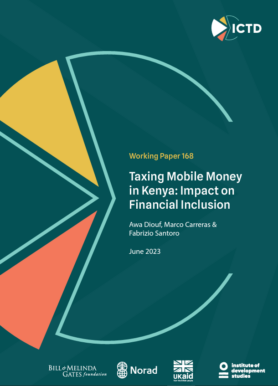Working Paper 168
Many people argue that mobile money has the potential to increase financial inclusion and improve the livelihoods of poor people in Africa. However, while many African governments impose specific taxes on mobile money transactions, very little is known about their effect on the use of mobile money services.
This study assesses the short- and long-term impact of the tax on money transfer fees that the Kenyan government introduced in 2013. The tax, more specifically an excise duty, was imposed on fees incurred in all money transactions, including mobile money. It was introduced at 10 per cent and increased to 12 per cent in 2018.
Our analysis has two parts. We use country-level data to see if the tax affected the use of mobile money – transaction values and volume – and the number of active mobile money agents. In addition, we use four rounds of nationally representative survey data to estimate changes in the use of mobile money after introduction of the tax.
We find that the excise duty did not have a significant impact on different aggregated indicators relating to the use of mobile money. However, survey data shows that the tax may have reduced the rate of increase in use of mobile money services affected by the changes in tax, such as sending and receiving money, compared to services that were not, like savings and paying bills. Importantly, while the amounts transacted may not change, users send and receive money within households less regularly. In addition, the tax seems to have a more detrimental impact on poorer households, which were less likely to be financially included before the tax was introduced. Larger households also show more negative effects after the tax.
